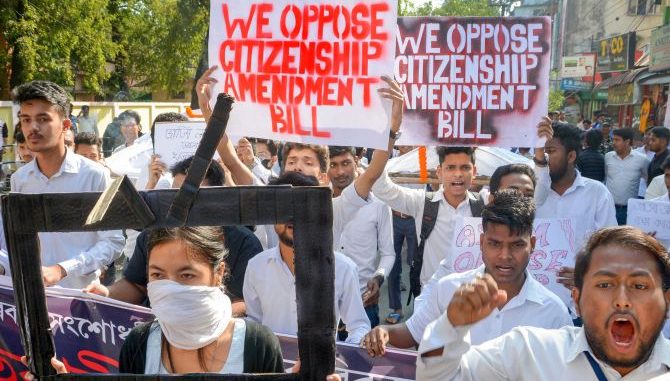
The Citizenship Amendment Bill (CAB) is creating a storm in both the Parliament and outside it. The furore is over the nature of the Bill. It aims to provide Indian Citizenship to people based on religion.
Here are the details.
The Citizenship Amendment Bill
- The Bill passed in the Lok Sabha seeks to provide those persecuted people or illegal migrants of Hindu, Sikh, Parsi, Buddhist and Christian from Pakistan, Afghanistan and Bangladesh, who have lived in the country without valid documents will be given Indian citizenship within 6 years.
- The current criteria to get Indian citizenship through naturalisation is 12 years of residence in the country.
Government’s Logic Behind the Bill
- The government states that it has brought the bill as these minority groups are being persecuted in Muslim-majority nations.
- The logic is dumbfounded as Hindus and Rohingya Muslims are persecuted in Myanmar, Tamils in Sri Lanka and Ahmed Shias in Pakistan.
- But, the government included in the Bill only certain religions and from certain countries only.
Is The Bill Constitutionally Valid?
- The Bill, by allowing only people from certain religions to take Indian citizenship is pushing the Muslim community to be second-class citizens.
- This is in violation of the Constitution’s Article 14, the right to equality of all persons.
- Any Act of Parliament cannot reshape the basic structure of the Constitution. Yet, the government opines that the Bill does not do that.
- Only the Supreme Court can respond to this once the bill becomes an Act.
North-East Conundrum
- The states from the North-East region of the country vehemently opposed the CAB.
- Due to this, most of the states that fall under the sixth schedule of the constitution and have Line of Permit system in place are left out of the Bill.
- That means any person declared as a foreigner in these areas cannot enter these areas even he/she is from the above-mentioned religions.
The Sixth Schedule
- All of Meghalaya and Mizoram and parts of Assam and Tripura fall under the Sixth schedule.
- The schedule provides special provisions of administration in these tribal areas.
- The CAB exemptions for these states apply to only areas that are under the sixth schedule.
- That means in Assam only tribal-majority areas of Dima Hasao, Karbi Anglong, and Bodoland Territorial Area Districts are exempt from CAB.
- This is the reason behind violent protests in Assam where already there is an incendiary politics of identity.
The Inner Line Permit System
- The Inner Line Permit (ILP) system was drawn from a colonial-era law – the Bengal Eastern Frontier Regulation, 1873.
- As per the system, to enter the areas that fall under the system – Arunachal Pradesh, Nagaland, and Mizoram – outsiders, even Indian citizens need an ILP.
- Only people from indigenous communities can own land and settle in these areas.
- Due to this, the government exempted these places from CAB.
- Manipur is also now exempted from CAB.
Nation-Wide NRC
- The government now wants to conduct a nation-wide National Register of Citizens (NRC) as the one that was carried out in Assam.
- But, the Assam experience shows that the exercise led to arbitrariness and mass exclusion.
Conclusion
With the automatic immunity provided to Hindus, Sikhs, Parsis, Buddhists and Christians under CAB, one can only expect mass rights-stripping and isolation of Muslims in the country.

Leave a Reply
You must be logged in to post a comment.